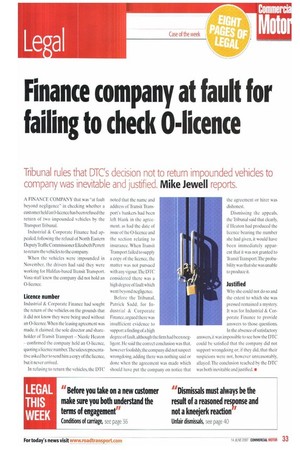Finance company at fault for failing to check 0-licence
Page 33

If you've noticed an error in this article please click here to report it so we can fix it.
Tribunal rules that DTC's decision not to return impounded vehicles to
company was inevitable and justified. Mike Jewell reports.
A FINANCE COMPANY that was "at fault beyond negligence" in checking whether a customer held an 0-licence has been refused the return of two impounded vehicles by the Transport Tribunal.
Industrial & Corporate Finance had appealed, following the refusal of North Eastern DeputyTraffic Commissioner Elizabeth Perrett to return the vehicles to the company.
When the vehicles were impounded in November, the drivers had said they were working for Halifax-based Transit Transport. Vosa staff knew the company did not hold an 0-licence.
Licence number Industrial & Corporate Finance had sought the return of the vehicles on the grounds that it did not know they were being used without an 0-licence. When the leasing agreement was made, it claimed, the sole director and shareholder of Transit Transport — Nicole Heaton — confirmed the company held an 0-licence, quoting a licence number.The sales representative asked her to send him a copy of the licence, but it never arrived.
In refusing to return the vehicles, the DTC noted that the name and address of Transit Transport's bankers had been left blank in the agreement, as had the date of issue of the 0-licence and the section relating to insurance. When Transit Transport failed to supply a copy of the licence, the matter was not pursued with any vigour.T1-te OTC considered there was a high degree of fault which went beyond negligence.
Before the 'Tribunal, Patrick Sadd, for industrial & Corporate Finance, argued there was insufficient evidence to support a finding of a high degree of fault ,although the firm had been negligent. He said the correct conclusion was that, however foolishly, the company did not suspect wrongdoing, adding there was nothing said or done when the agreement was made which should have put the company on notice that the agreement or hirer was dishonest.
Dismissing the appeals, the Tribunal said that clearly, if Heaton had produced the licence bearing the number she had given, it would have been immediately apparent that it was not granted to Transit Transport.The probability was that she was unable to produce it, Justified Why she could not do so and the extent to which she was pressed remained a mystery. It was for Industrial & Corporate Finance to provide answers to those questions. In the absence of satisfactory answers, it was impossible to see how the DTC could be satisfied that the company did not support wrongdoing or, if they did, that their suspicions were not, however unreasonably, allayed. The conclusion reached by the DTC was both inevitable and justified. •


























































































































































































